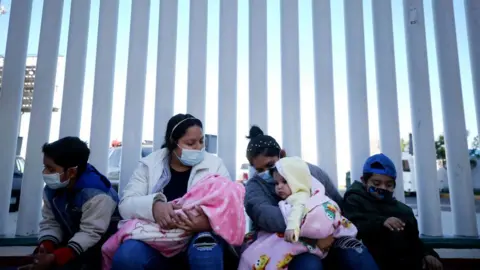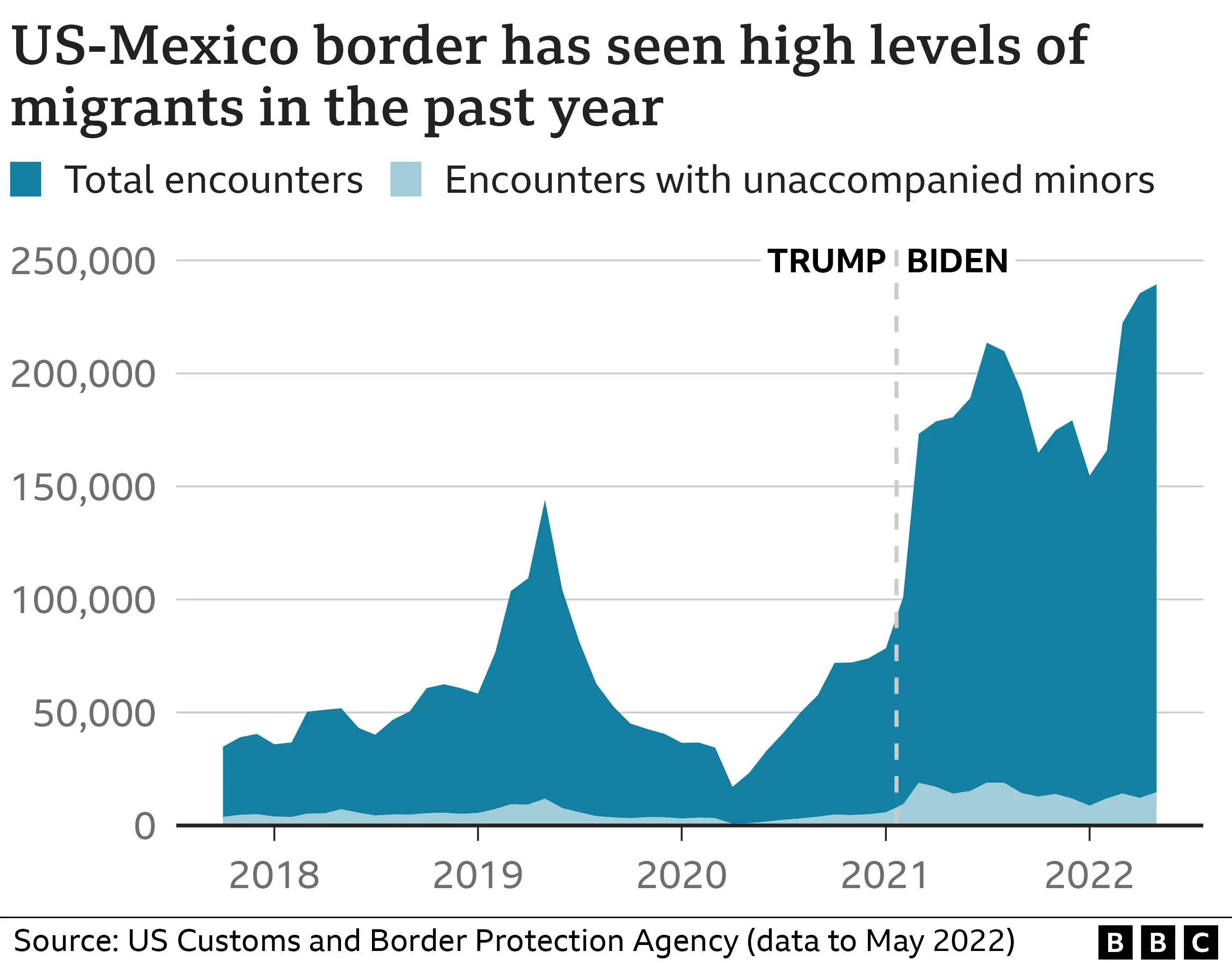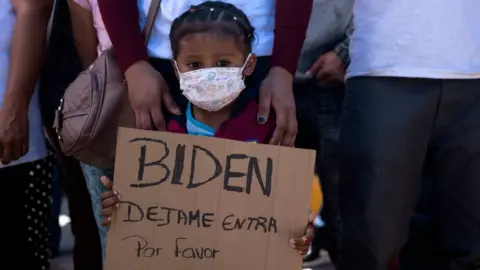What are President Biden's challenges at the Mexico border?
 Getty Images
Getty ImagesUS President Joe Biden entered the White House promising to tackle immigration challenges that have remained unsolved for decades.
Yet since he took office last year, the US has seen a record influx of migrants at its southern border, prompting criticism of the administration's policies from across the political spectrum.
Officials are now bracing for a potentially massive influx of migrants over the summer following the expected end of Title 42, a pandemic policy that allows migrants to be quickly expelled over concerns about spreading Covid-19.
Here's what we know about the situation.
Why the spike under Biden?
While the number of migrants at the border has been steadily increasing since April 2020, the numbers spiked sharply after Mr Biden took office.
Economic problems and environmental disasters in Honduras, Guatemala, El Salvador, Nicaragua and Cuba worsened during the pandemic, forcing some to take on a long and perilous journey north. Gangs and violence have also been given as reasons why some left home.
Mr Biden's plan to offer legal status to an estimated 11 million undocumented people in the US - a proposal that failed to gain enough bipartisan support to pass into law - is also blamed by conservatives for encouraging migrants.

Though he has avoided Mr Trump's rhetoric, Mr Biden has repeatedly called on migrants, including asylum seekers, not to attempt the journey to the US.
US officials say they are on pace to exceed two million migrant "encounters" in the fiscal year that began in October, the fastest pace in more than 20 years.
In May alone, statistics show that 239,416 arrests were made at the border, a 2% increase from April.
There's also been a sharp increase in the number of children crossing the border.
How do they get into the US?
Migrants cross the border in one of two ways. Those who believe they "have suffered persecution or fear that they will suffer persecution" in their home country are eligible to apply for asylum when they present themselves at a port of entry for admission into the US.
Others may evade border officials by hiding in cars or travelling undetected across unprotected - and often treacherous - parts of the US-Mexico border.
According to the Pew Research Center, at least 40% of unauthorised migrants in the country entered legally on short-term visas and overstayed.
Biden defends a Trump policy
On Covid, Mr Biden had kept a Trump-era emergency policy to automatically expel almost all undocumented migrants seeking entry, bypassing normal immigration laws and protections.
The policy - known as Title 42 - was aimed at preventing the spread of Covid-19 in holding facilities, officials said.
The measure sparked controversy within his party.
After twice extending it, the US Centers for Disease Control and Prevention (CDC) decided to end the policy on 23 May. The CDC said it was "no longer necessary" to maintain Title 42 given the current, more favourable public health outlook in the US.
 Getty Images
Getty ImagesBy that time, about 42% of all migrants encountered - 100,699 people - were expelled under Title 42. To date, over 1.8 million people have been expelled under the policy.
A federal judge, however, has blocked the administration from lifting the measure, likely sparking a legal battle.
The end of the policy is expected to lead to a massive influx of migrants arriving at the southern border, with Homeland Security officials estimating that as many of 18,000 migrants could be taken into custody each day.
Remain in Mexico policy
On Mr Biden's first day in office, his administration suspended a controversial Trump-era policy that forced asylum seekers to wait in Mexico for their US immigration hearings.
Since it was introduced in January 2019, about 70,000 migrants were enrolled in the programme informally known as Remain in Mexico.
But a ruling by a Trump-appointed federal court judge in Texas found that the administration had improperly cancelled the policy so it was restarted in December.
The US Supreme Court is expected to make a decision on its future later this week.
Separating families
One of the most substantive changes in border policy under Mr Biden has been a shift in how the government deals with migrant families.
A so-called "zero-tolerance" policy under Mr Trump meant families divided by US authorities, in some cases with parents being deported back to their home countries without their children.
Mr Biden has reversed that specific practice, and some families - but not all - have been reunited.
A task force set up by the president estimated that 3,913 children had been separated from their parents.
As of November, authorities were still trying to reach the parents of 270 children separated from their families, according to a court filing.
Unaccompanied children
As mandated by US anti-trafficking laws, Mr Biden's administration has been transferring non-Mexican minors to shelters overseen by the government.
Critics of the administration previously suggested that holding children in those facilities harkened back to a Trump-era policy, though children were being held for less time under Mr Biden.
In May, the number of children held in detention facilities declined by nearly 90% after they were transferred to the Department of Health and Human Services (HHS) for temporary resettlement.
Border wall
Mr Biden signed an order on his first day in office to pause all wall construction and to end the national emergency declaration on the southern border.
He later ordered that military funds Mr Trump had tapped for the project be diverted, leading to a Republican-requested inquiry into whether Mr Biden had inappropriately re-directed congressionally approved funds.
Property owners near the border have complained that despite the pause, the government is still seeking to seize borderlands for future construction using a process known as eminent domain.
Dozens of eminent domain cases brought by the federal government remain open and could take years for the courts to decide.
Some wall construction sites remain abruptly abandoned, with building materials strewn about, as construction had continued right up until the moment of Mr Biden's order to halt.
